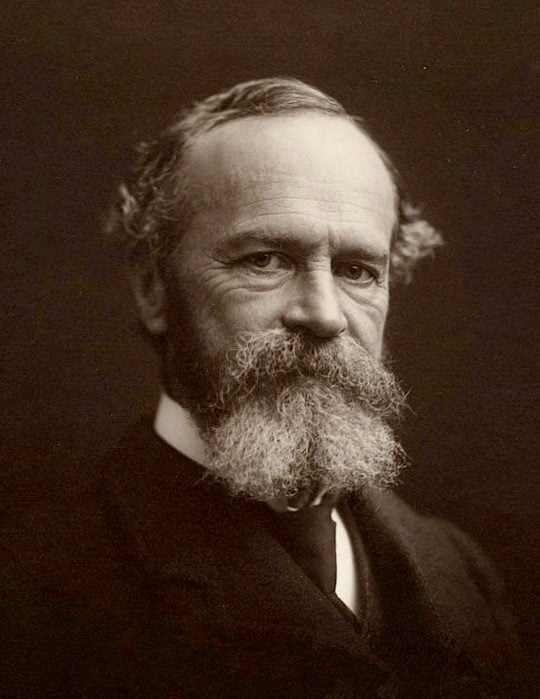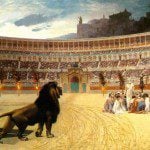
Earlier today, one of the commenters on this blog — I hope that he won’t mind my describing him as a non-believer — posted the following:
When faced with an unresolvable uncertainty, the correct response is agnosticism, not to embrace whatever hope or bias you have. You can want or hope, but the moment you let your desire outweigh your objectivity, you’re going to quickly find ways to reinforce it. No-one’s perfect at avoiding this, but that doesn’t mean you shouldn’t try.
I’m not altogether certain, if a matter is genuinely “unresolvable,” if the two (or more) available options are really, for all intents and purposes, equal, why one shouldn’t make a choice based on sheer desire, or whimsically decide by means of a coin toss? Especially if a choice is urgent or in some way inescapable. (The great al-Ghazali [d. 1111] offers a good metaphor for such a situation in the opening chapter of his Tahafut al-falasifa: (“The Incoherence of the Philosophers”): A hungry man stands between two juicy dates. They are, so far as he can tell, identical, but, for some reason, he can only choose one of them. Should he simply stand there forever, unable to decide between the two pieces of fruit? Or should he just choose one?)
Here, though, I want to call attention to the discussion of this very topic that occurs in the classic 1896 lecture “The Will to Believe,” by the great Harvard philosopher and psychologist Williams James (brother of the great novelist Henry James). To a large degree, it represents a response to the English mathematician and philosopher William K. Clifford’s earlier essay “The Ethics of Belief.”
“It is wrong always, everywhere, and for every one,” Clifford had written, “to believe anything upon insufficient evidence.”[1]
James, umm, doesn’t accept Clifford’s position:
Our passional nature not only lawfully may, but must, decide an option between propositions, whenever it is a genuine option that cannot by its nature be decided on intellectual grounds; for to say, under such circumstances, ‘Do not decide, but leave the question open,’ is itself a passional decision,–just like deciding yes or no,–and is attended with the same risk of losing the truth.[2]
Of course, there are cases where the costs of inaction, agnosticism, indecision, are negligible:
Let us agree . . . that wherever there is no forced option, the dispassionately judicial intellect with no pet hypothesis, saving us, as it does, from dupery at any rate, ought to be our ideal.[4]
In other cases, though, a decision is inescapable. Not to decide is, itself, a decision. Claremont philosopher Stephen Davis updates a Jamesian analogy (from carriage to truck, from male coach driver to female truck driver) while continuing to use James’s terminology of “genuine options,” “forced options,” and “momentous options:”
Imagine the following situation: while entering a steep downgrade, a truck driver suddenly discovers that her brakes have failed. The truck is starting to pick up speed and the driver sees that soon she will be in danger. The driver is faced with a choice: she can either immediately jump from the truck, risking bruises and broken bones while escaping the greater danger of a possible crash farther down the hill. Or she can remain in the truck, risking a crash but hoping eventually to guide it down the hill to a level spot. But the driver does not know how long the downgrade is; she cannot see where it ends and this stretch of road is new to her.
It surely seems that this is a genuine option for the driver. It is live, because both possibilities appeal to her as distinct possibilities. It is forced, because there is no third option beside jumping now or staying with the truck (jumping later is a logical possibility, but is clearly too unsafe to be seriously considered). It is momentous, because her life is at stake. And the evidence is ambiguous because, let’s say, neither possibility seems to her any safer or more dangerous than the other. Of course James had more reflective, intellectual situations in mind than this when he wrote ‘The Will to Believe’; in our thought experiment the driver must make up her mind almost instantaneously on the basis of the limited evidence that is available to her. Still, if this case does amount to a genuine option, then James would claim that she now has the intellectual right to choose whichever option she wants to choose, to let her passional nature decide.[5]
But the more careful ‘wishful thinking’ critic will now argue that the passional nature of the driver has nothing to do with the question of which is the safer choice. (We can imagine that one of the two options might prove to be objectively safer than the other to the driver and to other drivers and passengers on the road that day; experiments with many volunteer drivers in similar trucks trying out both options could be carried out.) The critic will claim that the driver has no other rational choice than to make up her mind on the basis of the (admittedly meagre) evidence that is available to her at the moment—her own driving abilities, the speed of the truck at the moment of decision, the appearances of the road ahead, the terrain at the side of the road (where she could possibly jump), etc.
In other words, the critic will argue that Russell’s Principle still holds in cases such as this for the simple reason that the driver’s passional nature might opt for the wrong alternative, the more dangerous one. But this leaves James the option of replying, ‘What evidence is there, in this or any other case of a genuine option, that deciding on the basis of one’s passional nature is more likely to lead to the wrong decision than deciding on the basis of the evidence, which we are granting is ambiguous?’ He could go on and say: ‘If this is a case that can (and thus should) be decided on the basis of evidence, then it is not a genuine option, and thus not a legitimate counter-example to the “right to believe” argument.’”[6]
But, of course, James wasn’t really talking about runaway carriages or coaches, let alone about trucks suffering from brake failure. Back to William James himself:
So proceeding, we see, first, that religion offers itself as a momentous option. We are supposed to gain, even now, by our belief, and to lose by our non-belief, a certain vital good. Secondly, religion is a forced option, so far as that good goes. We cannot escape the issue by remaining sceptical and waiting for more light, because, although we do avoid error in that way if religion be untrue, we lose the good, if it be true, just as certainly as if we positively chose to disbelieve.[7]
“Scepticism, then, is not avoidance of option; it is option of a certain particular kind of risk. Better risk loss of truth than chance of error, — that is your faith-vetoer’s exact position. He is actively playing his stake as much as the believer is; he is backing the field against the religious hypothesis, just as the believer is backing the religious hypothesis against the field. To preach scepticism to us as a duty until ‘sufficient evidence’ for religion is found, is tantamount therefore to telling us, when in presence of the religious hypothesis, that to yield to our fear of its being error is wiser and better than to yield to our hope that it may be true. It is not intellect against all passions, then; it is only intellect with one passion laying down its law. And by what, forsooth, is the supreme wisdom of this passion warranted? Dupery for dupery, what proof is there that dupery through hope is so much worse than dupery through fear? I, for one, can see no proof.”[8]
But that’s not quite all that Professor James has to say about Professor Clifford’s position:
When the Cliffords tell us how sinful it is to be Christians on such ‘insufficient evidence,’ insufficiency is really the last thing they have in mind. For them the evidence is absolutely sufficient, only it makes the other way. They believe so completely in an anti-christian order of the universe that there is no living option: Christianity is a dead hypothesis from the start.[3]
[1] $Cited by James, “The Will to Believe,” 8.*
[2] $ James, “The Will to Believe,” 11 (italics deleted).*
[3] $James, “The Will to Believe,” 14.*
[4] $James, “The Will to Believe,” 21-22.*
[5] $Davis, God, Reason and Theistic Proofs, 173-74.*
[6] $Davis, God, Reason and Theistic Proofs, 174 (emphasis in the original).*
[7] $James, “The Will to Believe,” 26.
[8] $James, “The Will to Believe,” 26-27.*
Posted from Park City, Utah













